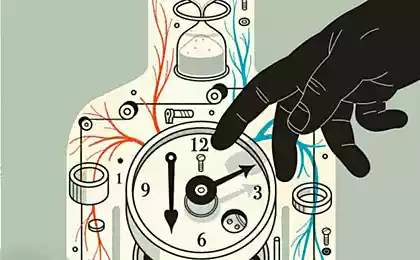532
As social and biological factors affect sleep

It began with a study of what a group of scientists from the University of Michigan released in 2014 Entrain mobile application that allows you to cope with jet lag, ie, jet lag syndrome. The users were given the opportunity if you want to share your data with a group of scientists. During this time, data from thousands of people from 100 countries have been collected. The researchers took into account age, gender, level of ambient light, bedtime and wake-up clock, the country of origin of the human subject and the purpose was to find out the connection between the social, biological factors and sleep mode, according to engadget.
The results showed that cultural attitudes may be more biological rhythms that significantly affects how much a person goes to bed. Morning duties affect the recovery time, but do not define it completely. "We found a strong influence on the wake-up time from the human biological clock, not the alarm," said Professor Daniel Fordzher the University of Michigan. In addition, influence social habits (eg, late dinners, early breakfast).
Scientists have a pretty interesting information from the application: for example, in Singapore and Japan, people slept an average of 7 hrs 24 minutes (the lowest rate), while in the Netherlands - 8 hours 12 minutes (the highest rate), in France, 8 hours, and in UK slightly less than 8 hours (Russia not in the list).
The researchers note that in 48 minutes the difference is very significant, because the lack of sleep, even for half an hour can make a big impact on cognitive function and health.

Also, the researchers found that people who spend most of the day in the daylight tend to go to bed earlier, and women, especially those aged 30-60 years, the average sleep for half an hour longer than men. Less sleep all middle-aged men.
There are many factors why so many people are deprived of sleep, for example - work and kids. Whatever the reason, research shows that many adults are increasing "debt" of sleep, which affects not only on their performance in the workplace, but also on health.
Professor Akilesh Reddy of Cambridge University, commenting on the data, noted that all the previous studies conducted in the laboratory, could not identify these regularities.
"The main result of the study - our biological clock we are programmed to perform specific functions, that we are not able to fulfill, as guided by social norms." It is already known that irregular sleep for those who work in shifts, leading to various diseases.
In addition to the findings themselves, the researchers say that the work demonstrates that mobile technology can be a reliable way to collect large amounts of data at very low cost.
Source: geektimes.ru/post/275590/
Tesla in 2016 plans to sell electric drives larger than the entire volume of the US market in 2015
The Swiss city has allowed to pay utility bills in Bitcoins
























